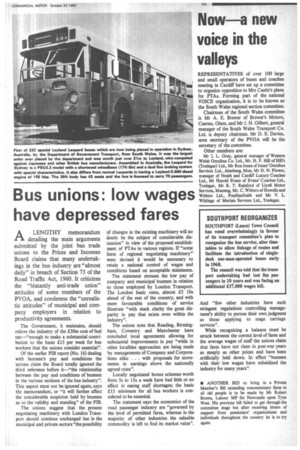Bus unions: low wages have depressed fares
Page 47

If you've noticed an error in this article please click here to report it so we can fix it.
ALENGTHY memorandum detailing the main arguments submitted by the joint bus trade unions to the Prices and Incomes Board claims that many undertakings in the bus industry are "almost daily" in breach of Section 73 of the Road Traffic Act, 1960. It criticizes the "blatantly anti-trade union" attitudes of some members of the PV0A, and condemns the "unrealistic attitudes" of municipal and company employers in relation to productivity agreements.
The Government, it maintains, should relieve the industry of the £30m cost of fuel tax—"enough to make a substantial contribution to the basic £15 per week for bus workers that the unions consider essential".
Of the earlier PIB report (No. 16) dealing with busmen's pay and conditions the unions claim the Board totally ignored the third reference before it—"the relationship between the pay and conditions of busmen in the various sections of the bus industry". This aspect must not be ignored again, says the memorandum, or "it will further affect the considerable suspicion held by busmen as to the validity and standing" of the PIB.
The unions suggest that the present negotiating machinery with London Transport should continue unchanged but in the municipal and private sectors "the possibility
of changes in the existing machinery will no doubt be the subject of considerable discussion" in view of the proposed establishment of PTAs in various regions. If "some form of regional negotiating machinery" were devised it would be necessary to retain a national control of wages and conditions based on acceptable minimums.
The statement stresses the low pay of company and municipal busmen in relation to those employed by London Transport. The London basic rates, almost £3 lOs ahead of the rest of the country, and with more favourable conditions of service illustrate "with stark clarity the great disparity in pay that exists even within the industry".
The unions note that Reading, Birmingham, Coventry and Manchester have concluded local agreements allowing for substantial improvements in pay "while in other localities approaches are being made by managements of Company and Corporations alike . . . with proposals for movements in earnings above the nationally agreed rates".
Locally negotiated bonus schemes worth from 5s to 15s a week have had little or no effect in easing staff shortages; the basic £15 minimum for all bus workers is considered to be essential.
The statement says the economics of the road passenger industry are "governed by the level of permitted fares, whereas in the majority of other industries the saleable commodity is left to find its market value".








































































































































